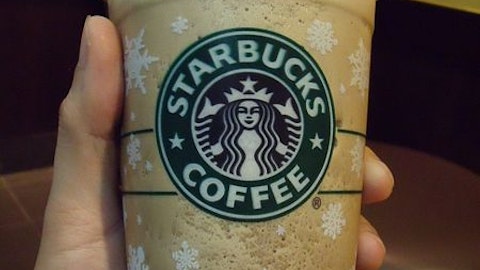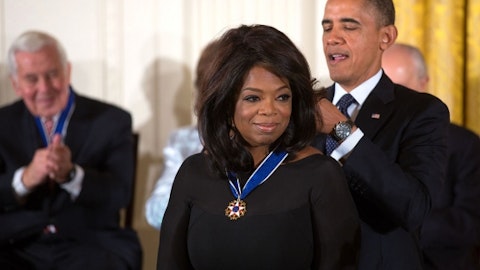Dunkin Brands Group Inc (NASDAQ:DNKN) and Starbucks Corporation (NASDAQ:SBUX) are two famous coffee makers. Most people, when asked about the most popular coffee shop brands, will immediately think of Starbucks, but can first impressions be applied to investing decisions? In this article we will try to find the answer to that question, stripping the stocks down to their fundamentals and looking at how other prominent investors are trying to make money off people’s hopeless caffeine addiction. Dunkin Brands is the older of the two brands, as it was founded back in the beginning of the 1950’s. The company is headquartered in Canton, Massachusetts, and runs two popular chains of fast-food restaurants: Dunkin’ Donuts and Baskin-Robbins. The business model of the company is built entirely on a franchise approach, and today Dunkin Brands is represented by more than 11,300 Dunkin’ Donuts restaurants globally, and by 7,300 Baskin-Robbins retail stores in over 50 countries.

Most investors don’t understand hedge funds and indicators that are based on hedge funds’ activity. They ignore hedge funds because of their recent poor performance in the bull market. Our research indicates that hedge funds partly underperformed because they aren’t 100% long. Hedge funds’ fees are also very large compared to the returns generated, which reduces the net returns delivered to investors. We uncovered through extensive research that historically, hedge funds’ long positions in certain stocks actually outperformed the market greatly, and it has held true to this day. For instance, the 15 most popular small-cap stocks among funds has beaten the S&P 500 Index by more than 84 percentage points since the end of August 2012. These stocks returned a cumulative of 142% vs. less than 58% for the S&P 500 Index (read the details). That’s why we believe investors should pay attention to what hedge funds are buying, particularly in the small-cap sector, rather than what their net returns are.
Despite its latter birth in 1971 in Seattle, Starbucks takes the leading role among the world’s coffeehouses. As of today, the brand operates from over 21,500 stores in 64 countries around the globe. The striking difference between Starbucks and Dunkin Brands lies in how the former develops its business: around half of its stores are privately owned, while the other 50% are franchised. Such an approach provides more flexibility for Starbucks in terms of adapting to changes in customers’ tastes, but strikes heavily at profitability and margins as we will see below.
In terms of valuation, both stocks are traded at a P/E around 32, which looks like a fair number for them given the historical perspective of the past four to five years. However, Starbucks is cheaper on a P/S basis, as it is traded at a 4.94x multiple, while Dunkin Brands offers a price which exceeds sales by 7.06 times. Looking one year forward, Starbucks is a little bit cheaper based on its PEG ratio: the multiple comes out to 1.83 versus 1.93 of its opponent.
Based on profitability, Dunkin Brands scores a complete victory over Starbucks, with an average five-year operating margin of 38.12%, while Starbucks’ respective margin equals just 11.92%. The difference is explained in the way the companies structure their business. However, despite having an almost 13 times higher D/E ratio, Dunkin Brands returns around 32.41% on equity on average, while its competitor reports an average of 26.16%. At the end of the day, Starbucks grows its revenue by 11% per annum on average, leaving Dunkin Brands behind at 6.8%, and erasing the profitability advantage described above.
Insider activity in Starbucks Corporation (NASDAQ:SBUX) shows that in June, 500,000 shares were sold by CEO Howard Schultz, which occurred after he had exercised his options. There were no major acquisitions of shares by insiders this year. Dunkin Brands Group Inc (NASDAQ:DNKN)’s track of insider actions is a bit more diverse in 2015. Following a February acquisition of 969,579 shares by various top-executives, several of them, including CEO Nigel Travis, decided to exercise their options and sell 290,898 shares on the open market by the end of April.
Adding to the buying and selling of shares by insiders, the activity of hedge funds, covered by our extensive database, was pretty much mixed as of March 31. Ken Griffin’s Citadel Investment Group added 83% to its position in Dunkin Brands Group Inc (NASDAQ:DNKN), becoming the top shareholder in our database with 1.91 million shares valued at $90.91 million. Eashwar Krishnan, managing Tybourne Capital Management, initiated a $78.43 million position in the stock, owning some 1.65 million shares. His bet on Dunkin Brands now accounts for a substantial 7.3% position in his public equity portfolio. On the contrary to what has been done by those colleagues, the third-largest shareholder, Brett Barakett’s Tremblant Capital, trimmed its position by 55%, leaving 1.15 million shares valued at $54.63 million in its portfolio. The other hedge funds in the list of top 10 shareholders were positive on the stock during the first three months of the year.
As for Starbucks Corporation (NASDAQ:SBUX), its largest shareholder in our database was Donald Chiboucis’ Columbus Circle Investors, which reduced its holdings by 26%, leaving it with 1.97 million shares valued at $186.33 million. Phill Gross and Robert Atchinson’s Adage Capital Management slightly increased its ownership, by 4%, bringing its total position to 1.13 million shares valued at $107.48 million. In general the top 10 owners showed a wild diversity of dynamics in terms of positions’ adjustments: from 116% increases to 66% cuts. Overall, at the end of March, 20 funds in our database held shares of Dunkin Brands Group Inc (NASDAQ:DNKN), valued at $424.99 million, $91.40 million more than at the end of 2014. As for Starbucks Corporation (NASDAQ:SBUX), 54 funds owned this company after the first quarter, having invested $962.13 million, which was $124.28 million less than three months before, despite shares appreciating during the month by about 15%.
Based on that, we conclude that overall, funds’ sentiment is currently more bullish on Dunkin Brands. The final decision about what stock to pursue depends on the type of investor. If you like to see rapid growth and a strong balance sheet, then Sturbucks is a good choice. If you prefer relative strength and higher profitability, it is high time to jump into Dunkin Brands’ stock, alongside other prominent investors and their funds.
Winner: Draw
Disclosure: None




